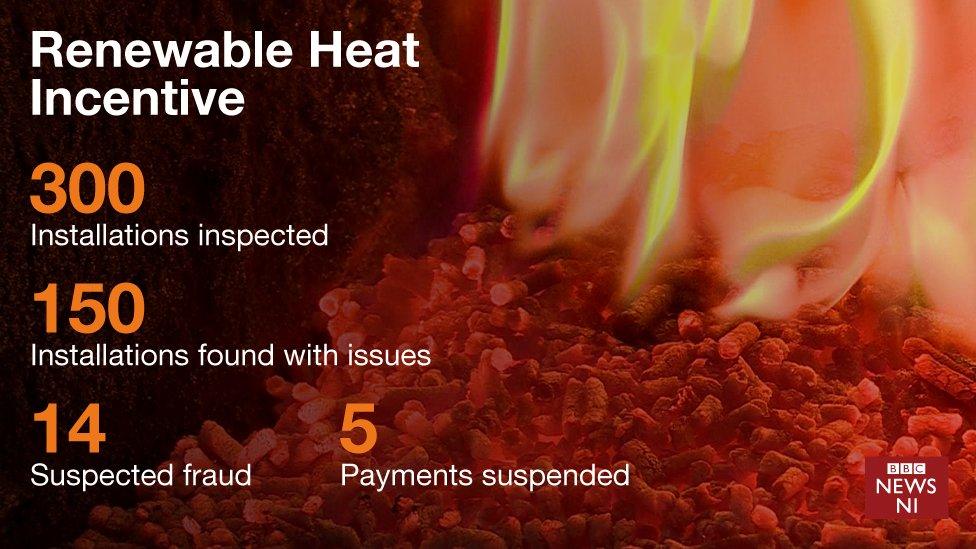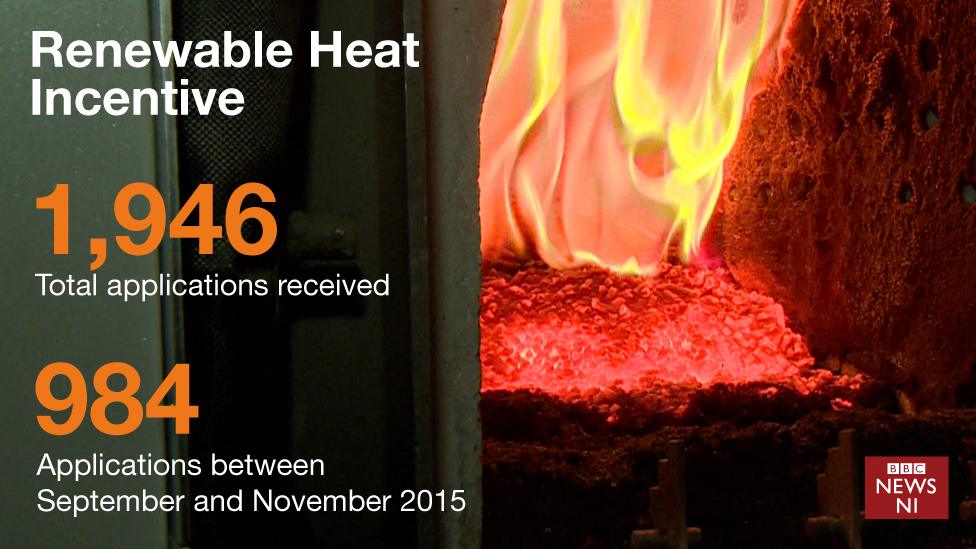RHI scandal: RHI 'cash for ash' scandal to cost NI taxpayers £490m
- Published

Flaws in setting the scheme's subsidy rate left it open to abuse as claimants could earn more cash the more fuel they burned
The cost of the botched renewable heat incentive (RHI) scheme to the Northern Ireland taxpayer will be £490m, the Department for the Economy has said.
The original estimate for the scheme given at an Assembly committee hearing was £400m over 20 years.
On Friday, the DfE said £490m would be "the maximum burden" on the budget.
The way the Renewable Heat Incentive (RHI) scheme was set up in Northern Ireland meant the subsidies offered were greater than the cost of the fuel.
The green scheme was set up by the Department of Enterprise, Trade and Investment under the stewardship of now First Minister Arlene Foster in 2012 to encourage businesses and other non-domestic users to move from using fossil fuels to renewable heating systems.

In what has been dubbed the "cash-for-ash" scandal, the flawed scheme meant users could legitimately earn more cash the more fuel they burned.
In a statement, a spokesperson for the DfE said: "In regard to the cost of the RHI scheme, the Comptroller & Auditor General's report estimated the 20-year costs of the scheme, if nothing is done, to be £1,150m.
"C&AG stated this involves 'a number of uncertainties' and represents 'the best estimate of the worst case'.
"Based on a forecasted 3% Barnett share of the allocation for the GB scheme, the projected available budget is £660m. Based on those published figures, the maximum burden on the Northern Ireland budget would be £490m. "
The spokesperson said the department had been developing proposals for changes to RHI which, if accepted, could lead to a significant reduction in future costs to the NI Executive. The detailed discussion included legal advice and engagement with the European Commission.
Earlier, Finance Minister Máirtín Ó Muilleoir claimed the cost could be "the best part of £600m". He told BBC Radio Ulster that hundreds of people were "using heat in an ineligible way".
"Anyone heating an empty shed has been stealing public money," he added.
An independent audit found issues at half of the 300 installations inspected - 14 of which fell into the most serious category where fraud was suspected and payments to five of these have been suspended.
But the finance minister said the number was much higher.
"The evidence is the payments," he said. "If this was used in an eligible way, we would not be using so much heat."
He said "some people are earning £40,000 a year from this scheme" and those "gaming the system" should be removed immediately.

Mr Ó Muilleoir said while the British government was committed to covering half the scheme's costs, there was an "additional challenge" if the scheme was not being used "for the purposes for which it was intended".
The threat the scheme posed to the budget was "enormous", he said, adding that his department had struggled to get all the RHI information from the Department for the Economy.

Renewable Heat Incentive in numbers
1,946 applications were approved under the non-domestic RHI scheme - a 98% approval rate
984 were received in just three months - September to November 2015 - after officials announced plans to cut the subsidy but before the change took effect
The assembly's Public Accounts Committee was told that a subsequent independent audit had found issues at half of the 300 installations inspected
14 of those fell into the most serious category where fraud was suspected
Payments to five of these 14 sites have been suspended

The scandal has caused political upheaval in Stormont, with calls for Mrs Foster to stand aside while an investigation is carried out.
Last week, Jonathan Bell, a former enterprise minister, broke ranks with his Democratic Unionist Party colleagues and made a number of sensational claims about how the controversial scheme was handled.
Earlier this week, Mrs Foster, the leader of the Democratic Unionist Party, survived a vote of no-confidence. On Monday, opposition politicians staged a walk-out protest when Mrs Foster started to make her statement on RHI.
Assembly Speaker Robin Newton has faced criticism after allowing his party leader to continue and during his Radio Ulster interview, Mr Ó Muilleoir said the speaker "brings baggage" to his work.
"I see no future for Robin in that job in 2017," he said.
- Published21 December 2016

- Published23 October 2019

- Published7 November 2017

- Published16 December 2016